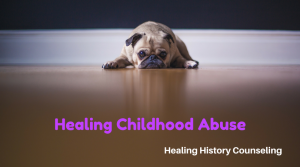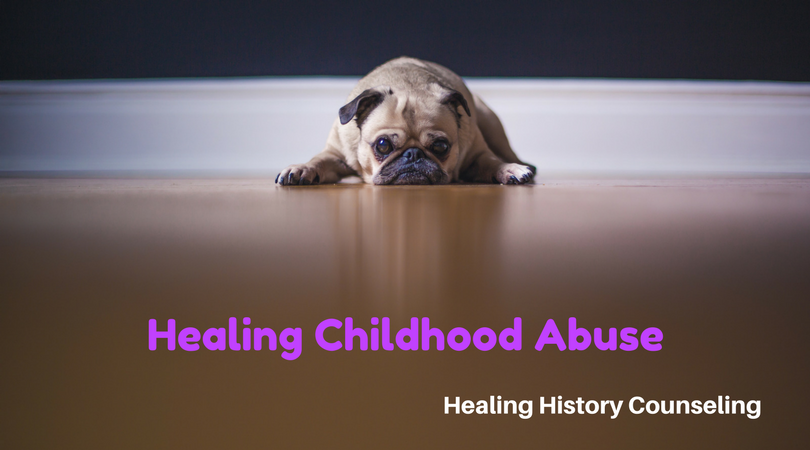

Growing up in a home where there is violence, abuse and/or neglect can lead to a child internalizing a belief that they are somehow bad, dirty, worthless, or the cause of all the bad stuff that happened in their childhood home. This can be the root of our adult feelings of shame. Brene Brown (a researcher, author, and public speaker on shame), defines shame as “the intensely painful feeling or experience of believing that we are flawed and therefore unworthy of love and belonging”. This is very different from regret or guilt. Let’s take a moment and explore how these three feelings are different from each other.
Regret, Guilt, & Shame
Regret
- The negative thought and/or feeling we experience when something we have said or done has led to a negative outcome and we wish we hadn’t done it or could undo what we said or did.
- Can lead to us behaving differently in the future, owning our responsibility in the outcome, and/or attempting to fix or make amends for what happened.
- Can be a constructive emotion, in that it can motivate us to repair and strengthen connections with others.
- Regret encourages us to change and grow, to do better in the future.
Guilt
- The negative thought and/or feeling we experience when we judge something we have said or done as bad or wrong.
- Can lead us to behave differently in the future, take responsibility for our behavior, and/or attempt to fix or make amends for what we did.
- Can be a constructive emotion, in that it can motivate us to repair and strengthen connections with others.
- Guilt encourages us to change and grow, to do better in the future.
Shame
- The negative thought and/or feeling we experience when we judge that we are bad or wrong.
- Can lead to us withdrawing from people, connection, and relationships. Can cause us to hold ourselves back from others because we fear they will become aware of the fact that we are bad or wrong.
- Is a destructive emotion in that it can cause us to withdraw from, break, or never try to build connections with others.
- Shame does not encourage change or growth. The belief that we are wrong or bad feels like fact and facts cannot be changed.
Regret and guilt can be a healthy part of our emotional experience. They inform us of when we have made mistakes or caused harm that we need to fix. Shame is not a healthy part of our emotional experience and can lead to our withdrawing from people and relationships. So how do we get rid of shame? In a nutshell, resolving shame requires compassion, particularly self-compassion. Obtaining or achieving compassion can be challenging.
What is compassion and self-compassion? Why do we need it to heal shame?
Compassion is the loving emotional connection to another’s pain; it allows someone to feel another’s pain, along with the desire to help relieve that person’s suffering. Self-compassion is the ability to see your own self in a loving accepting way and understand your pain from your past behaviors. Your ability to see your poorest behaviors in light of your being an imperfect person who is capable of becoming less imperfect through growth and (when appropriate) reparations. Compassion is the psychological equivalent to the loving hug we need (or needed as a child) to sooth a physical injury. It doesn’t make what happened not have happened, it simply allows us to recover enough to address the injury.
The challenges to resolving shame
- We don’t believe shame is mistaken. We believe that we are bad, wrong, or in some way not deserving of compassion. The fact that we believe it to be accurate can hold us back. It can be useful to ask yourself if anyone else did this thing would you believe them to be bad, evil, incapable of becoming better or making right? If you find yourself allowing for others to have done the same thing without being inherently bad, notice this. Use this belief as a way to allow for just enough room to try healing your shame.
- We want to hide our shame. Receiving compassion requires sharing the thing which we are ashamed of. Even if we are trying to create self-compassion, we have revisit the memory of that which we are ashamed. The very shame we are trying to heal can hold us back from taking the steps we need to take to resolve the shame.
- We believe we need to our shame. We may believe that our shame is what keeps us from repeating those same mistakes again in the future. If we let go of our shame we’ll do it again. But shame does not help us become better people. Regret and guilt are better emotions for that. By holding onto the shame, we are actually not allowing ourselves to grow and do better in the future.
- Others may react badly. This one’s difficult because it could be accurate. Many of the things we are ashamed of are difficult for other people to hear. Many people have their own shame around mistakes they’ve made and having never resolved their shame they do not know how to help you resolve yours.
Healing shame can be challenging. Having someone help you through the process can make the process go smoother and be more successful. But you need to choose carefully.
5 steps for choosing a good person to help heal your shame
- Choose a good listener. Some people are better listeners than others. A good way to gauge this is to see how you feel after talking with them about a small upset or difficulty. After sharing did you feel satisfied, relieved, or heard? This would indicate that person may be a good listener. But, if you felt frustrated, annoyed, dissatisfied, or let down, they may not be good listeners and not an appropriate choice.
- Choose someone with compassion. The friend who has compassion for others will probably feel compassion for you. The friend who wants to help every stray puppy, homeless person or can see the good in their worse enemy is probably a good bet for having lots of compassion.
- Choose someone who’s available. Even the best choice won’t work if their life is so busy and they can’t give you their full attention for a chunk of time (or several chunks of time).
- Test the waters. Think you’ve found the right person, check to be sure. Share something small. Maybe something you feel regret or guilt for but not shame. If they handle that well then try something harder.
- Hire a therapist. Not sure any of your friends fit all of these requirements? Or perhaps the fact that a therapist has to maintain your confidentiality (with some exceptions which they will explain ahead of time) makes them a better (or less risky) choice for you. If you hire a therapist, still do step 4! I wish all therapists were great, but some are not. If they fail with the smaller stuff, go find a different one and test again.
Some tips for fostering Self-Compassion and healing shame.
- Consider what you would believe a loving parent, friend or benevolent God would say to another person who is like you (same age, gender etc as you were when the event occurred) and did the same thing. Then say that thing aloud to yourself.
- Gently challenge the negative self-talk. Remind yourself that choices and behaviors are bad, not people. Everyone has the capacity to learn and grow (and make better choices in the future).
- If you wouldn’t say it to your best friend, don’t say it to yourself. Stop letting yourself be mean to yourself. If you can’t stop believing it then simply start by stopping saying it. Try instead: “I choose not to speak to myself that way”
- Shift shame to guilt. Remember that shame is the belief that you are bad, and guilt is the belief that you did something bad. This is a huge distinction! When you hear yourself calling yourself bad, wrong or unworthy reword the way you speak to yourself to you made a bad choice, your choice was the wrong one, and that behavior was regrettable (unworthy of being repeated).
- Notice what you do right. Start paying attention to the things you get right and giving yourself credit for those things too. Gaining a more balanced view of oneself is an important step away from shame.
Shame does not help us become better versions of ourselves. Shame does not help us make better choices in the future. Shame is a toxic and harmful emotion that needs to be exposed, challenged, and healed so that we can start being that better person each of us is capable of becoming.
Leave a Reply